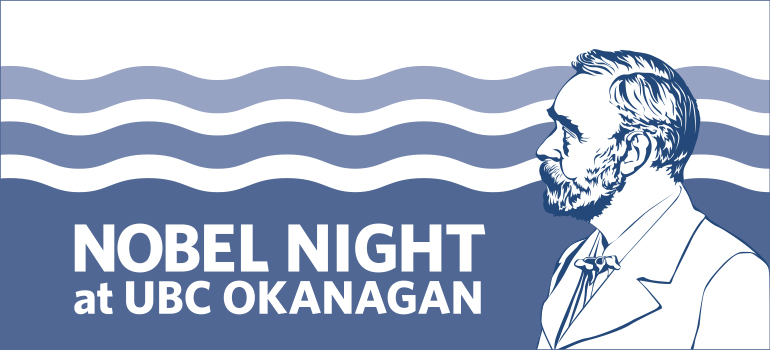Learn about the world-changing discoveries and achievements
What: Nobel Night panel discussion at UBC Okanagan
Who: University researchers discuss the 2019 Nobel Prizes
When: Tuesday, December 10, beginning at 7 p.m., refreshments to follow
Where: Room COM 201, The Commons building, 3297 University Way, UBC Okanagan, Kelowna
Planets, poverty, peace and powerful batteries. The science and activism behind all of these are tied together this year by the lasting legacy of Alfred Nobel’s annual recognition for game-changes.
On December 10, thousands of kilometres away from the Okanagan, world leaders will gather in both Stockholm and Oslo to watch as the 2019 Nobel Prizes are presented. This year, 15 laureates will be honoured for discovering planets outside our solar system, working to reduce global poverty in all forms or trying to stop a war.
At UBC Okanagan’s Nobel Night — a tradition upon its own — university professors will explain why these awards and the recognition they garner are relevant in today’s changing world. UBC professors will discuss each award, the winners and why they matter.
The event, emceed by UBC Vice-Principal and Associate Vice-President, Research and Innovation Phil Barker, takes place in the Commons lecture theatre. Following the presentations, there will be an opportunity for audience questions and a social with refreshments.
This event is free and open to the public. For more information and to register visit: 2019nobelnight.eventbrite.ca
The Nobel Prize in Physics
Tim Robishaw, adjunct professor in the department of computer science, mathematics, physics and statistics will talk about James Peebles work on theoretical discoveries in physical cosmology. The award is jointly shared this year with Michel Mayor and Didier Queloz for their discovery of an exoplanet orbiting a solar-type star.
The Nobel Prize in Chemistry
Jian Liu, assistant professor of mechanical engineering, will discuss the work of John B Goodenough, M Stanley Whittingham and Akira Yoshino for the development of lithium-ion batteries.
The Nobel Prize in Physiology or Medicine
Glen Foster, assistant professor in the School of Health and Exercise Sciences, will highlight William G Kaelin Jr, Peter J Ratcliffe and Gregg L Semenza’s discoveries of how cells sense and adapt to oxygen availability.
The Nobel Prize in Literature
Bryce Traister, professor of English and dean of the Faculty of Creative and Critical Studies, will talk about Peter Handke for his influential work with linguistic ingenuity.
The Nobel Peace Prize
Professor of Political Science Helen Yanacopulos will speak to the accomplishments of Abiy Ahmed Ali for his efforts to achieve peace and resolve the border conflict between Ethiopia and Eritrea.
The Economic Sciences
UBC Provost and Vice-President, Academic Ananya Mukherjee Reed will discuss the work of Abhijit Banerjee, Esther Duflo and Michael Kremer for their experimental approach to alleviating global poverty.
About UBC’s Okanagan campus
UBC’s Okanagan campus is an innovative hub for research and learning in the heart of British Columbia’s stunning Okanagan Valley. Ranked among the top 20 public universities in the world, UBC is home to bold thinking and discoveries that make a difference. Established in 2005, the Okanagan campus combines a globally recognized UBC education with a tight-knit and entrepreneurial community that welcomes students and faculty from around the world.
To find out more, visit: ok.ubc.ca
